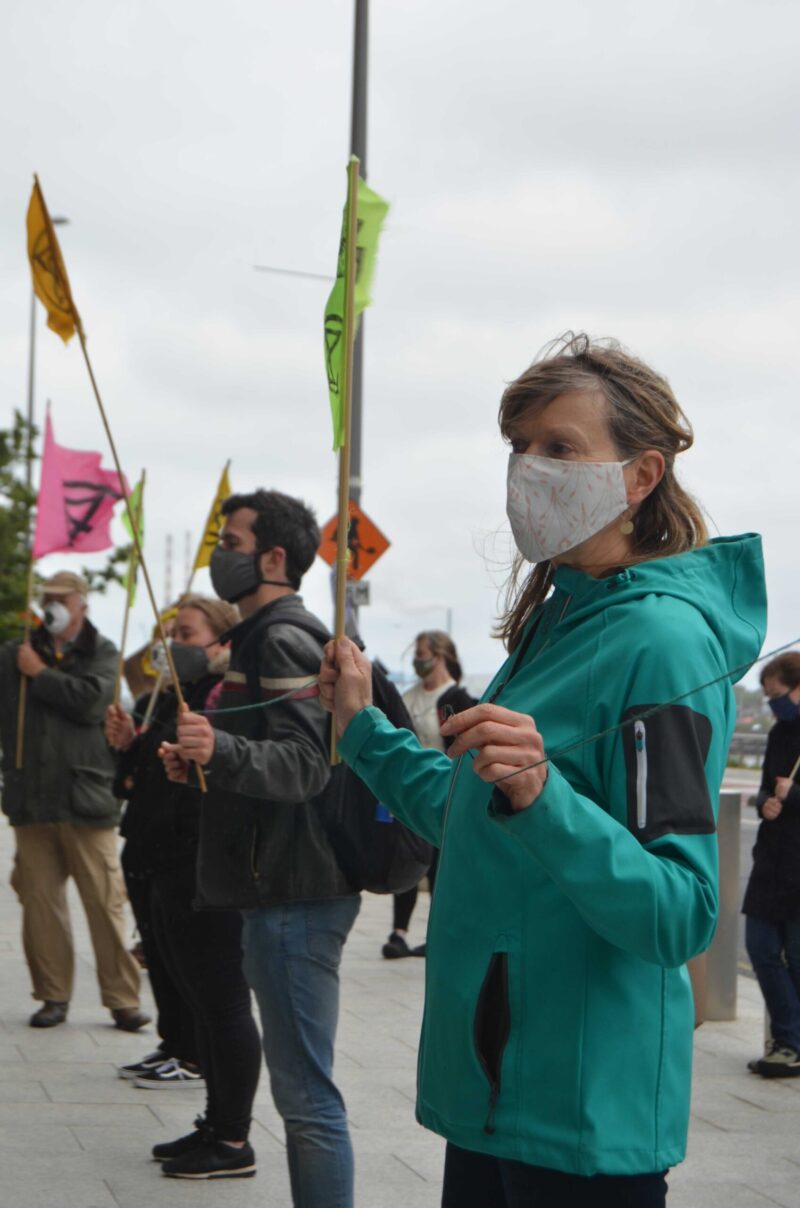As public attention shifted from the climate crisis to sit almost solely on public health, Trinity’s staff working hard for the good of the environment, and protest movements in Dublin alike, have had to improvise to maintain the progress of the last few years.
The Provost’s Sustainability Adviser Michele Hallahan has seen these challenges first hand. She says the pandemic, “hasn’t shifted our focus. But what it has changed is that we can’t have events”.
While the university’s sustainability initiatives can continue to progress, engaging with students and staff to encourage more environmentally friendly living has become much harder.
Similarly, Fabian O’Neill, an Extinction Rebellion (XR) Ireland activist, admits that getting people involved with climate activism has never been more challenging. “The craziness of this year means that I wouldn’t blame anybody, if they didn’t have a huge amount of time to contribute to climate activism.” He added: “There is so much depression, there’s so much anxiety, there are so many external factors that make it so difficult.”
Fortunately, the pandemic-necessitated shift to online engagement has been met with some success. At Trinity, the Green Campus Committee (GCM), which Hallahan chairs, includes staff and students, and aims to help change behaviours and contribute plans to make Trinity more environmentally-friendly. The GCM recently set up nine sub-committees over Zoom (one for each sustainability initiative), where each is given the chance to define how Trinity goes about continuing to work towards their goal.
There is so much depression, there’s so much anxiety, there are so many external factors that make it so difficult
Hallahan explains how Trinity’s sustainability strategy aims to solve specific problems and improve concretely in a variety of areas. She says that the key to the effectiveness of her work is producing a “tangible result”.
In that vein, last year’s community vote to plant a wildflower meadow on College Green, as well as a recent survey asking students to choose a new sustainable product for sale in the Trinity College Dublin Students’ Union shops, are examples of what Hallahan says is, “about democratizing decision making.” And this is a process which not only engages the community on sustainability, but is also possible even under lockdown.
At XR, hard choices had to be made as Covid-19 cases began to rise in March. O’Neill explained: “We don’t have to abide by government regulations. We could say no, these regulations are ridiculous. But we had to face up to the fact that we need to be a group that tries to listen to science.”
Thus, a large climate action rally in Dublin involving many activist groups was cancelled. “We could not bear having even a single coronavirus case associated with an Extinction Rebellion protest”, he said.
But during the coronavirus pandemic, the entire model that climate activists rely on had to be done away with. In the past, XR showed its strength through numbers, but now, a combination of socially distanced protests and online events is the best that can be done given the circumstances.
For example, on September 14th activists from an XR affiliate group ascended the entrance to the Department of Agriculture and performed a socially distanced protest against the Common Agricultural Policy (CAP), which critics say leads to overproduction and waste.
XR’s large, monthly “General Meetings” as well as their signature “Non-Violent Direct Action Training”, are usually the best ways of getting people involved in sustainability activism. Now though, the online equivalents just haven’t been as effective.

The normal model for climate activists has been thrown out the window – for now they have to settle for socially distanced protests and online events.
“We’ve been doing it for months,” O’Neill says of their online activities, “and we’re only really getting the feel of it now”.
Many of Trinity’s professors are also deeply involved with the fight for climate action.
Trinity zoology professor, Yvonne Buckley, explained: “We’ve put the long-term crisis on the back burner to deal with the short-term crisis.”
In her estimation, the pandemic, like many issues society will face in the coming years, are results of the continued destruction of our environment. “We know that the current pandemic has its roots in biodiversity loss and land use change”, she said, “We need to keep making these connections.”
Like many people actively involved with the climate crisis, Profesor Buckley understands why people struggle to focus their attention on the need to protect the environment. Unlike the immediate economic and social pain caused by the coronavirus pandemic, connecting the dots between climate change and its wide-ranging and slow-building effects is more challenging.
“It’s not like the climate crisis will suddenly make terrible things happen – we’re going to get multiple shocks, like this current shock, happening at greater and greater frequency as we proceed through that long timeline of the climate and biodiversity emergencies.”
We know that the current pandemic has its roots in biodiversity loss and land use change”, she said, “We need to keep making these connections
While people are aware of the dangers of continued pollution and ecosystem destruction, climate was only voters’ fourth highest concern in the last Irish election which took place even before the pandemic hit, the Irish Times reported.
Aside from her research Buckley is actively involved with the fight for more effective climate policy and recently gave a submission to the Joint Panel on the Climate Action Bill stressing the importance of the inclusion of carbon budgets. She noted that, “If you have no means of implementing change, to make progress towards those targets, then it’s pointless.”
Prof Buckley also sees the need for many types of action in getting things done for the environment. Commenting on groups like XR Ireland and Fridays for the Future, she said: “The science supports the sense of urgency that those groups have.”
All across Dublin, people continue to work towards a more sustainable future. The pandemic has meant that many of the most effective means of bringing about change have become impossible, but with improvisation, and a continued sense of urgency, focusing on the environment is still feasible. As O’Neill puts it, even in this unprecedented time: “It really is just about getting involved and getting organized. It’s still our job to use whatever tools we can to make the tone of the conversation more urgent.”







